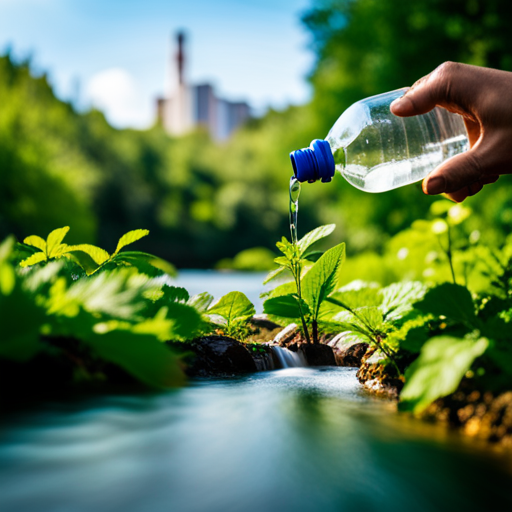Spring water has long been considered a natural and healthy source of hydration, with its perceived mineral content and potential cognitive benefits. However, the use of spring water has also been associated with several disadvantages, particularly those related to environmental degradation and contamination. These factors have raised concerns about the sustainability and safety of using spring water as a primary source of hydration.
In light of these issues, it is important to examine the pros and cons of spring water use both from a health and environmental perspective, and to explore alternative options for safe and sustainable hydration.
This article aims to provide an objective overview of the benefits and drawbacks of spring water for both human health and the environment. It will explore the various factors that influence the quality and safety of spring water, including the potential for contamination and overuse.
Additionally, the article will consider alternative options for hydration that are both safe and sustainable, such as tap water and other types of bottled water. By examining these factors, readers will be equipped with the information necessary to make informed decisions about their drinking water choices, while also promoting the conservation of natural resources.
Key Takeaways
– Spring water is perceived as a natural and healthy source of hydration, with potential cognitive benefits and minerals like magnesium.
– However, there are concerns about environmental degradation, contamination, and health risks associated with contaminated spring water.
– Alternative options for safe and sustainable hydration include tap water, home filtration systems, rainwater harvesting, and exploring sustainable alternatives to bottled or filtered tap waters.
– Improved hydration leads to improved brain function and cognitive performance, and responsible management practices are needed to preserve natural springs and promote sustainable hydration options.
Benefits
The natural source and mineral content of spring water, including calcium, magnesium, and potassium, have potential benefits for cognitive function.
Improved hydration through consuming spring water can lead to improved brain function and cognitive performance.
Studies have shown that even mild dehydration can negatively impact cognitive function, including memory, attention, and reaction time.
The minerals found in spring water, especially magnesium, have also been linked to improved brain function and may even help prevent cognitive decline in older adults.
In addition to cognitive benefits, spring water can also provide a natural and refreshing source of hydration.
Unlike artificially flavored beverages or sodas, spring water contains no added sugars or artificial sweeteners.
This makes it a healthier option for those looking to increase their fluid intake without consuming excess calories or harmful additives.
Overall, the natural source and mineral content of spring water make it a beneficial choice for those looking to improve their hydration and cognitive function.
Disadvantages
One potential issue with relying on natural sources of hydration is the susceptibility to contamination and resulting health risks. Spring water, while a natural source of hydration, is vulnerable to contamination from a range of sources, including animal waste, pesticides, and industrial pollutants. This can lead to serious health issues, such as bacterial infections, chemical poisoning, and even cancer.
In addition to the direct impact on human health, the overuse of natural springs can also have negative impacts on local ecosystems and wildlife. Overuse can lead to the depletion of water resources, which can have serious consequences for local flora and fauna. Furthermore, the variability of spring water quality can deter consumer loyalty and create inconsistencies for companies that rely on a steady supply of water.
These considerations highlight the need for responsible management practices to preserve natural springs and for consumers to explore alternative options for hydration.
Alternative Options
Alternative options for hydration include tap water, home filtration systems, rainwater harvesting, and exploring sustainable alternatives to bottled or filtered tap waters. Tap water is a reliable and safe option for hydration, as it is regulated by the government and tested for contaminants. Home filtration systems can improve the taste and quality of tap water, making it a more appealing choice for those who prefer a better taste. Furthermore, rainwater harvesting is an alternative option that can provide a sustainable source of water. This practice involves collecting rainwater from rooftops and storing it in tanks for later use. Harvested rainwater can be used for irrigation, washing, and even drinking with proper filtration and treatment.
To compare the different options for hydration, we have created a table that outlines the advantages and disadvantages of each option. This table can help consumers make an informed decision about which option is best for their needs. It is important to consider not only the health benefits but also the environmental impact of each option. Rainwater harvesting and exploring sustainable alternatives to bottled or filtered tap waters can help reduce the waste generated by single-use plastic bottles and promote responsible water management practices. As consumers, we can make a difference by choosing sustainable options that protect both our health and the environment.
| Option | Advantages | Disadvantages |
|---|---|---|
| Tap water | Regulated by government, safe, affordable | May contain chlorine or fluoride, taste varies by location |
| Home filtration systems | Improved taste and quality, reduces contaminants | Initial cost, ongoing maintenance |
| Rainwater harvesting | Sustainable source, reduces demand on municipal water | Requires storage tanks, requires filtration and treatment |
| Sustainable alternatives | Reduces waste from single-use plastic bottles, promotes responsible water management | Limited availability, may be more expensive |
Conclusion
In conclusion, spring water has both advantages and disadvantages for health and the environment.
While it may contain beneficial minerals and potentially improve cognitive function, it is also susceptible to contamination and can negatively impact local ecosystems.
Inconsistent quality and variability may also pose challenges for consumer loyalty.
As such, it is important to weigh these factors and consider alternative options for safe and sustainable hydration.
These may include filtered tap water, reusable water bottles, and environmentally-friendly packaging.
By making informed choices and preserving natural resources, we can promote both personal and planetary health.




